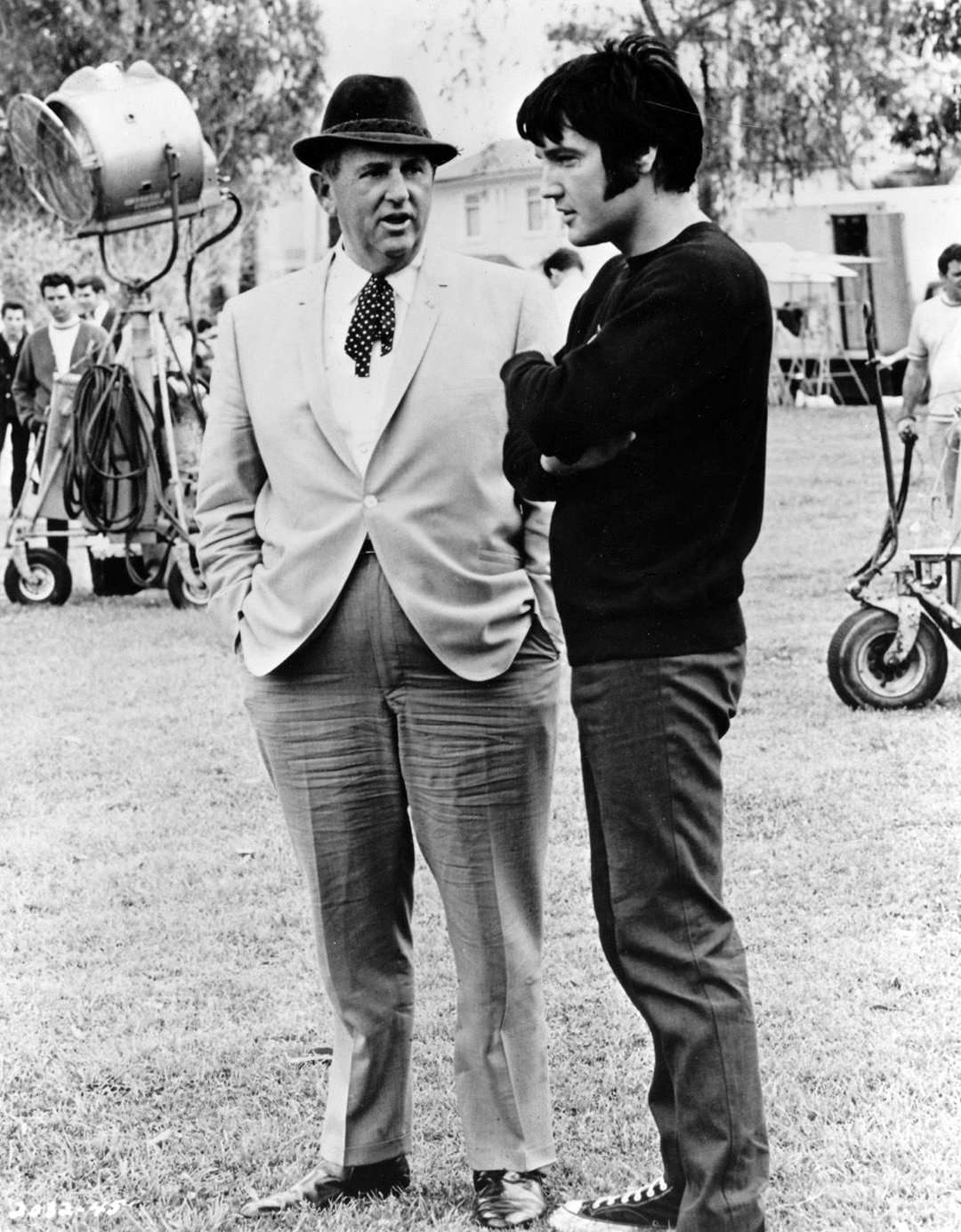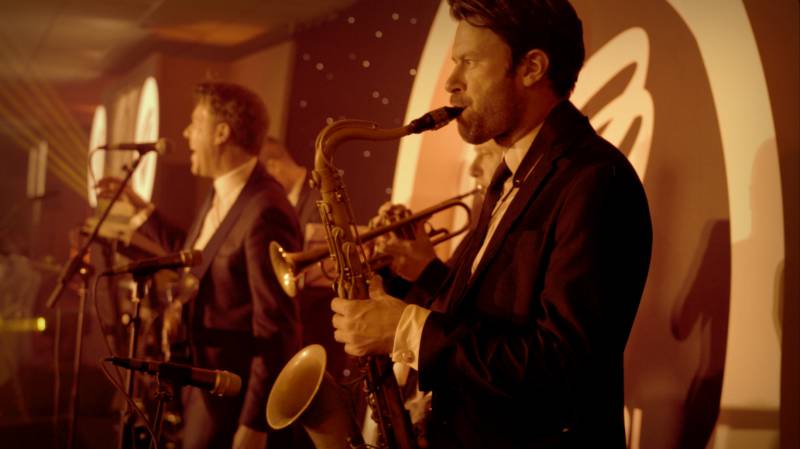A TV Exec once offered $50,000 for a prime time appearance from the Rock N Roll superstar, Elvis. The response from his infamous manager, Colonel Parker, was simple enough: “That’s fine for me, now how much will you give Elvis?”

Whether you are writing your own original music, or performing as part of a working covers band, we can all do with extra help navigating the business of the music industry.
This is where artist managers and entertainment agents step in – helping take away some of the business/promotional pressures so that you can concentrate on writing, recording and performing.
Role of an Artist Manager
Traditionally, an artist manager has always been described as the closest person to the band, without being a member. He or she will be the gateway to the group, negotiating contracts, working on promotional ideas and generally using their personal contacts to help navigate
Colonel Parker & Elvis Presley
and nurture the band/artists career. Famous examples of music managers include Don Arden & daughter Sharon Osborne (Small Faces / ELO/ Black Sabbath/ Ozzy Osbourne), Peter Grant (Led Zepplin), Alan Mcgee (Oasis) and Scooter Braun (Justin Bieber).
In times past, managers would usually take a minimum of 20% of a band’s total earnings. While this was the stock deal for years, the revolution in indie music labels, rise of streaming vs. slump in royalty payments and 360-degree major label deals has also seen management percentages change (as well as what revenue streams are governed by that percentage) at least at the development stage.
In general, when negotiating for new management, never give away a percentage you are unhappy with. You should always feel like your manager will be able to devote sufficient time to your career, with nothing but your best interests at heart.
Role of Entertainment Agents
An entertainment agent shares some traits with an artist manager, but will usually have a more “hands off” approach. That said, they will still have a very vested interest in a bands success.
An entertainment agent will have an entire roster of acts at their disposal (spanning everything from cover & party bands to DJ’s and Jazz swing singers).
Clients (be they brides & grooms, corporate events planners, or anyone else looking to book live entertainment) will go to the entertainment agent for advice on what acts to book and they will then recommend them acts from their roster. The client will then book their preference.
The Groove Cats
Entertainment agents will usually charge a percentage of whatever fee is paid, or will occasionally add their commission on top of what you charge.
It’s worth noting an alternative to the role of an entertainment agent is the entertainment directory (such as ). Acts pay a small amount to be featured as part of the directory and then keep 100% of any resulting fee, negotiating directly with clients.
A big difference between an agent and a manager is that a function band may work with several different entertainment agents, rarely exclusively signing to one.
What an Artist Manager wants to see from your band:
1. A seamless stage show – Being able to put on an exciting show is an absolute must! Try not to leave awkwardly long gaps between songs and interact with the audience appropriately. Make sure to add some variation to your live set - segway between songs, play acoustic versions and add exciting introductions while making sure you look like you’re enjoying yourself and really getting into the performance!
2. A professional attitude to social media – Make sure your social media is updated regularly. Don’t post content people will find offensive and try and work out what sort of content your audience engages with best. Try taking a look at the Facebook and Twitter pages of popular bands in a similar genre for inspiration.
3. Individuality, personality & charisma – You need to show some character in interviews, and make people interested and enthusiastic about both your band and you as a person. Make sure you are approachable and friendly after gigs, and interact with your fans. Meeting potential managers works exactly the same way - be both friendly and memorable.
Like him or loathe him, Noel Gallagher’s’ big personality comes through on & off stage
4. Professionalism – In some respects it doesn’t matter how good your music is, if you don’t have the right attitude no manager is going to want to work with you. Playing music is fun, but you also have to hold yourself to some standards. If you want to succeed, you’ve got to be respectful of venues and people, even if you don’t feel you are beating treated fairly. Don’t shout, swear or be abusive. Be calm and explain yourself clearly. Don’t get so drunk or high that you are unable to perform competently. If you have a reputation as a professional and likable band, managers are much more likely to be knocking on your door.
5. Ambition – Managers love to see artists that have ambition, and think big. If you want to get to the stage where you can make a living from your music, say so… There’s nothing wrong with that! This should be tempered with having a good handle on the industry and having a realistic idea mapped out for moving your career forward. A manager will help you put this into practice.
What an Entertainment Agent wants to see from your band:
1. High quality promotional images – Using a professional photographer for your images is really going to show it’s worth. It will make you look more appealing to both the agent and the client. Think carefully about the image you are looking to put across.

2. An exciting promotional video – A good promotional video will show you performing and give the clients a preview of what to expect from your show. Make sure the audio is of good quality and all the live footage shows your act and stage show in the best possible light - check out this awesome promo video by funk-rock act Funk Out.
3. Studio quality recordings – Recording in a professional studio environment is always going to be the way to get the best results from your band because you’ll have the input of an experienced producer who is working with very expensive equipment.
While some people have good quality home recording software, anything you release as a band should sound as if you’ve spent good money in a recording studio. If you want to record at home to save on costs, consider sending it away to be mixed and mastered professionally.
We love this shot of Leeds City Stompers
4. A “USP” – A “unique selling point” is a business term for having a feature that helps a product stand out, especially in a market with lots of competition. Try having a unique aspect in your look, repertoire or theme that gives your band more individuality. This will help an entertainment agent sell you to potential clients.
5. Willingness to work hard – A very simple point, but when you speak to a prospective entertainment agent, make sure to convey that your band is prepared to work hard to keep clients happy and go the extra mile.
If your band is looking to take things to the next level, consider registering with the entertainment directory.
ALSO READ:
Last Minute Musicians give insight into what entertainment agents and artist managers look for in emerging bands & artists
.jpg)
 Whether you are writing your own original music, or performing as part of a working covers band, we can all do with extra help navigating the business of the music industry.
Whether you are writing your own original music, or performing as part of a working covers band, we can all do with extra help navigating the business of the music industry. 

 2. An exciting promotional video – A good promotional video will show you performing and give the clients a preview of what to expect from your show. Make sure the audio is of good quality and all the live footage shows your act and stage show in the best possible light - check out this awesome promo video by funk-rock act Funk Out.
2. An exciting promotional video – A good promotional video will show you performing and give the clients a preview of what to expect from your show. Make sure the audio is of good quality and all the live footage shows your act and stage show in the best possible light - check out this awesome promo video by funk-rock act Funk Out.





